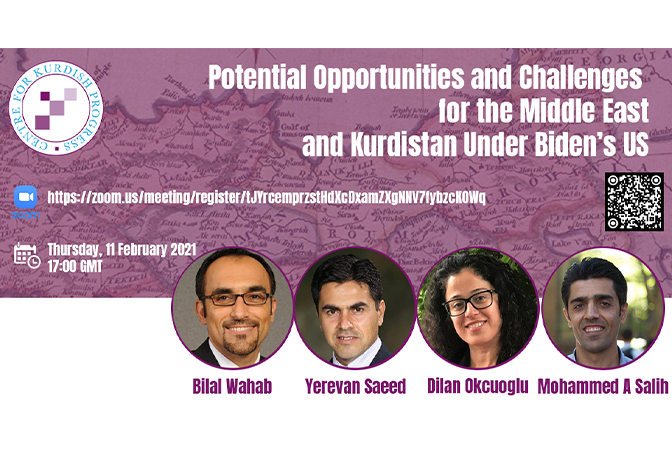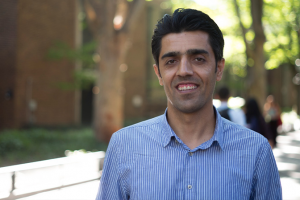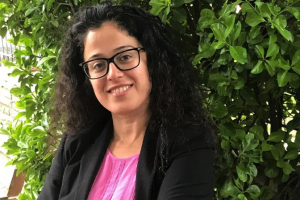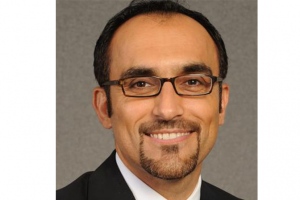Thursday, 11 February 2021
at 5pm GMT
In this panel discussion, experts Yerevan Saeed , Dr. Dilan Okcuoglu and Mohammed A. Salih, assessed the prospects of Kurdish political actors during Biden’s presidency. The event was moderated by Bilal Wahab, who started by introducing the expert speakers and their professional profile. He then introduced the topic in the form of brief questions directed at each speaker. Throughout the discussion, Wahab would ask each speaker specific questions to capitalise on their knowledge and expertise.
Kurdish-United States historical relations
Salih focused on describing the US-Kurdish relations by pointing out key observations with references to key dates in the broader historical context. The main observation was the lack of US policy vis-à-vis the Kurds because the Kurds are only a by-product of the US policy vis-à-vis the regional State actors such as Iraq, Iran, Turkey and Syria. These by-products are referred to as the “War on Terror” since 9/11, meaning groups such as Al Qaida and the Islamic State. To elaborate on the US-Kurdish relations, he mentioned the relationship as being formed on a temporary basis but with strong engagement. This has fallen short of a so-called “alliance” and has led to periods of humanitarian disasters in Kurdish history. Examples of such periods include the 1970’s first collapse of the Kurdish autonomous experience that led to the mass displacement of Kurds fleeing to Iran; after the Iraq-Kuwait war, the then US president George H.W Bush encouraged an uprising against Saddam Hussein but failed to support the uprising of the Kurds and Shia groups which ended in the displacement of millions of Kurds and killing of thousands. However, between the years 2003-2010, the United States’ relationship grew stronger in promoting democratisation in Iraq, but this again proved disastrous with the Obama administration withdrawing US troops from Iraq and the Kurds were let down again. A more recent event, the Kurds sacrificed themselves and defeated the Islamic State which was not a cause of concern for the Kurds, but it was the failure of the US policy in Iraq, Syria and Iran. However, despite this sacrifice, the Trump administration turned their backs on the Kurds once the 2017 Iraqi referendum was mentioned. Salih made clear that the 2017 referendum was not directed at declaring an independent state but an act to reconfigure and the Kurdish-Baghdad relationship.
States territorial control mechanisms
Okcuoglu focused on the aspect of Kurdish territorial control and the creation of the new phenomenon that is the KRG and Rojava, which was created by the US and SDF alliance in the war against the Islamic State. She further commented on how the Kurds were doing themselves as a minority in a position of power in holding territory over other religious and ethnic minorities and their treatment towards them.
To begin with, with reference to her PhD research, she set out the territorial mechanisms, strategies and practices of territorial control implemented by nation-states in the form of securitisation, control of movement across borders, administrative and democratic control. Using the Turkish state as an example, the practice of expulsion as a form of territorial control mechanism was used since the 1990s against the Kurds who refused to act as village guards for the Turkish state in the fight against the PKK. Furthermore, this mechanism is experienced by the people in the area through their emotions, influencing their political values. Based on these emotions, they make decisions even though the State does not make decisions based on sentiments of its peoples. This leads the people to expulsion, displacement and the excessive violence used against them as a form of securitisation and further leads to the control of movement across borders which the people experience as intra-minority fragmentation. In addition, administrative and demographic control leads to the violation of collective rights. The nationalising of the landscape creates a denial and loss of cultural heritage which is vital for the practices of that minority. She suggested that using this framework of territorial control, and we may view the KRG and Rojava’s treatment of ethnic and religious minority groups under their control.
Where are Kurdish issues based on the United States’ National Security and foreign policy priorities?
Saeed emphasised where the Kurdish issues stood on the United States’ National Security and foreign policy priorities. In agreement with Salih’s statement, he pointed out that the Kurdish issue was only dependant on the divergence and convergence of the United Nations’ vital interest in the regional State actors such as Iran, Iraq, Turkey and Syria which have so far largely been disastrous for the Kurds. He pointed out that where the Kurds in the past have had the opportunity in expanding their political influence such as the creation of KRG and Rojava, they have ultimately failed in capitalising their protentional thereby leading them to not be exploited to their full extent as is the example of their involvement with the war on the Islamic State. Furthermore, US-Kurdish alignment is dangerous since it is translated into indifference and disregard to the regional state actors. Instead, Saeed recommended that the Kurds try to force balance relations with the regional powers in a strategic tip-toe approach between the United States and the regional states to risk their elimination and ensure survival. This is influenced by the fundamental factors that the Kurds cannot change their geography, and their relations are not formalised with the United States. This informal relation which has not been institutionalised has been at best chaotic, predictable and has led to the betrayal and unavoidable disappointment since there is no legal ground in marking the responsibilities of either side.
Kurdish agency
Based on Saeed’s view, Wahab made the statement that “the United States is a superpower/giant so to grab the attention of that giant you need to be either a giant or a pebble in the giant’s shoes”. Therefore, he asked the panel what role the Kurds can play and can a relationship between a superpower and a subnational government (KRG and Rojava) exist?
Salih responded to this question by highlighting the very serious strategic limitation to the Kurdish capacity in terms of exercising agency in the region and internationally. This limitation has existed since the double colonial bind of the collapse of the Ottoman Empire and the aftermath of the First World War, leaving the Kurds a non-sovereign actor and stateless. Therefore, the extent of Kurdish relationship with any sovereign actors is limited, which is a barrier in asserting and exercising Kurdish agency. Salih suggested that this limitation could be overcome, such as in the KRG and Rojava regions. There should be a clear vision both domestically and internationally on where the Kurdish end goal should be.
Additionally, the mode and form of governance internally should work towards the democratising the domestic political spaces and making sure that other minorities in the same lands are included in governance matters and made real stakeholders. However, regarding Kurdish agency internationally there is the need for a diversification of the Kurdish engagement with both regional actors (mutually beneficial) and broader international relations of the Kurds with the sovereign States especially now with the rise of China and Russia. This would help situate the Kurds in a position that would allow them to manoeuvre between global actors and regional states that currently hold sovereignty over them.
Saeed, however, disagreed about the Kurdish limitations. In his view, being non-state actors does not mean that they cannot form special relations with the United States. Using Taiwan as an example, he demonstrated that they have been able to formalise their relationship since they have maximised their demands. In his view, up until now, the Kurds have used short term technical demands which have served right for that particular period. Saeed proposed that the KRG revise their engagement and diplomacy since the tools they have been using are outdated and traditional. More engagement is needed on a strategic level. For example, the war on ISIS, where 67% of Americans were sympathetic to the Kurds, could have been used on a larger scale than just limiting the engagement to Congress. Furthermore, he points out the failure of the KRG in including the Kurdish diaspora in the United States.
The emergence of Kurdish diplomacy
Finally, the Kurds have diplomacy and have Kurdish representatives from KRG since 2004 with their own offices; the SDF have their representative and Komala as well. Wahab stated that it seems that the Kurds are starting to behave like States even if they don’t have one, but are they playing a well game in Washington D.C.?
Okcuoglu was of the view that geopolitics also plays another factor in Kurdish diplomacy. In her opinion, in today’s globalised world, globalisation can be challenging in dealing with nation-states since diplomacy is still conducted on a nation-level, which creates controversies. These are not always counter-productive for stateless peoples since they gain more power. There are emerging sectors of new formations of hybrid security governments where sovereignty is fragmented and shared between States and state actors. There are challenges that the State faces on territorial control, but there is a change in diplomacy in the shifting of political and strategical alliances. Bilan points out that transnational dimensions have already gained such power to have already begun challenging States’ jurisdictions and boundaries. In referencing the work of Riordan’s theory of “live diplomacy”, she urged scholars and policymakers to change their mindset and create an interaction with ordinary people, refugees and stateless groups. Further pointing out the need to adopt a new narrative of investing in Kurdish research centres would benefit the young generation and the policymakers and public opinion.
Okcuoglu further argued that the new diplomacy is important because wars have already become trans-border, requiring non-state actors’ involvement, but this has been the failure of State-driven diplomacy in reaching marginalised groups that Saeed mentioned.
Okcuoglu suggests a new form of diplomacy as a bottom-up approach where the diplomacy is action-driven on the ground rather than limited to demands and negotiation tables (hard power). She further suggests the use of soft power (action-driven and tolerant of minorities).
What do the Kurds want?
Questions from the audience were put to the panel, particularly the question of Kurdish unity and what the Kurds want from D.C? Wahab accommodated this question by stating that the KRG internationally reflects the unity and message of back home. When the KRG was united back home between 2005-2007, the message to D.C. was clear. However, if the home front becomes increasingly divided then rather than the policy being national and institutional, it becomes more personalised both back home and abroad. Therefore, the political parties speak for themselves and bypass the KRG office and have their diplomatic outpost.
The most important condition that the Kurds need is outside of the immediate, transient and security goals and objects of the United States in the region. This relationship needs to be transformed going beyond security and incorporating other aspects of life to make this relationship into a long-lasting strategy. Also, support to the Kurds should be made on the condition of domestic democratisation and ensuring human rights domestically. This was Salih’s answer. However, Saeed was not so sure in pinpointing what the Kurds want. He shared similar views with Salih and mentioned the need to create long-lasting relations and formalise the United States and Kurdish relations, but this depends on the research conducted and the decision-makers’ thought process.
Saeed adds to his argument that financial constraints are an issue since the KRG has increased its budget yearly, but the outcome is minimal. Also, he criticised the KRG’s push and pull tactics in them not knowing when to seize the opportunity as was the case of the 2017 referendum where they should have formalised their relations.
Saeed pointed out that the KRG has some setbacks which limit its display of democratisation. The KRG needs to uphold the rule of law if they want to be relevant in D.C. again since the Biden administration pays close attention to human rights as is the case of the sanctions on Myanmar.
Okcuoglu’s approach to the question differed and was separated into the Kurds’ general demands and more specific demands based on the countries they reside in and different Kurdish political actors.
Firstly, on the general level, she focused on creating stable and democratic institutions and institutional arrangements that can hold accountability. This was backed up by the view that the US tries to solve problems in the Middle East by creating personal relations with leaders. Secondly, the United States should pressure the Turkish government to stop violating human rights and focus on its democratisation agenda, which has already failed. Thirdly, by pressuring Turkey to release political prisoners since they have already commented on the case of Selahattin Demirtas. Finally, we should question whether the Western States are willing to give us what we demand.
In terms of specific demands of the Kurds, Okcuoglu focused on Turkey. She pointed out that the Turkish army should first stop cross-border operations in Iraqi Kurdistan and Rojava, which killed civilians. Secondly, for Turkey to restart the peace talks with the PKK. Thirdly, to see the impact of territorial control since even when democratisation is in place, another due process is taking place where the state continues to pursue territorial control by the military having been bestowed with extensive power in the Kurdish region. Finally, the Turkish statehood on the ground should be the subject of debates to showcase to international actors the injustices that have been committed, which impact our relationship not only with military alliances but also with political and diplomatic fields.
Is president Biden good news for the Kurds and what opportunities can the Kurds seize?
This question was tackled by Salih, whereby he focused on what we should expect from the Biden administration in each of the sovereign States that the Kurds occupy. About the KRG and Rojava, he advised that the Biden administration refrains from bringing any harm, preserving the status quo and maintaining levels of support for the Kurds. However, he mentioned that this is becoming highly uncertain due to the emergence of the “United States endless wars” and the progressive element of the democratic party. What has been observed so far from his administration is worrying and holds the potential for setting a series of motions that could be very detrimental to the Kurds. Furthermore, the Iranian Kurds are in the front line of an aggressive area if the United States renewed its repression over the Nuclear weapons.
Moreover, the Syrian Kurds have already faced counter-productive measures by the American troops leaving Syria, which established some sort of Assad recognition. Lastly, the Turkish-American relations are unpredictable even though Biden’s administration has commented on the detainment of Osman Kavala. Overall, the primary hope is that the Biden administration should do no harm and refrain from adopting policies that could be risky for the Kurdish interest. Nevertheless, resolving tensions in the region should continue but not in placing hopes on one State actor to bring about peace.
Policy recommendations and advice
The panel discussion ended with the moderator Wahab giving the speakers a chance to put forward policy recommendations and advice for both the Kurds and the Biden administration.
The three panellists agreed on the importance of human rights and democracy as an advice for the KRG and Rojava regions, where they should create long-term strategic visions, become more transparent and make peace with the Kurdish diaspora. Furthermore, to seek more balanced and diversified relations both within the region and internationally (China and Russia). Okcuoglu also mentioned the importance of soft power. Additionally, recommendations and advice were also mentioned by Salih and Saeed about the Biden administration. Firstly, the United States should be serious about human rights and not sacrifice it to geopolitical interests. Secondly, readdressing the historical injustice that the Kurds have endured to bring about discussions on Kurdish statehood is long overdue. Finally, the administration should restore the balance of power between the KRG and Baghdad to resolve issues over Kirkuk.
Speakers’ biographies
Mohammed A. Salih is a doctoral candidate at the Annenberg School for Communication, University of Pennsylvania.
Salih’s research broadly focuses on the intersections of (geo)politics, media and culture, as well as the study of identity, ideology, and power, with the Middle East region constituting his main area of empirical focus.
Prior to his PhD journey, Salih worked as a, mostly freelance, journalist for around a decade covering the Islamic State conflict, the aftermath of the Iraq War, and Kurdish affairs. He still occasionally writes for and provides commentary to media outlets. His bylines have appeared in the New York Times, Washington Post, The Guardian, Inter Press Service (IPS), Al Jazeera English, Al-Monitor, Foreign Policy, Newsweek Middle East, Christian Science Monitor, France 24, The Daily Beast, The Nation, Middle East Eye, World Politics Review, The Kurdish Globe, The Cairo Review of Global Affairs and The Independent, as well as Kurdish news publications Rudaw, Awene and Xebat. His video stories have aired on Deutsche Welle (DW), FRANCE 24, Channel News Asia, and Rudaw. He has been interviewed extensively on international news outlets such as Sky News, DW TV, France 24, CNN, Fox News, i24 News, BBC Radio, VOA News, Rudaw and NPR commenting on Kurdish and Iraqi affairs.
He has also published analytical pieces with Washington-based think tanks Middle East Institute and the Washington Institute for Near East Policy on local politics of Kurdistan.
Dr. Dilan Okcuoglu is a postdoctoral fellow in Global Kurdish Studies at the American University, School of International Service in Washington, DC. Prior to that, she was a visiting scholar at the Cornell University, M. Einaudi Center for International Studies.
Also, affiliated with the Interdisciplinary Research Center on Democracy and Diversity at the Université du Québec à Montréal in 2018-2019. She received her PhD and MA in Political Studies from Queen’s University in Canada. She has another MA degree from Europe (Central European University); finished her undergrad in economics (Bogazici University). In addition to academic life, she has keen interest in diplomacy and policymaking. Dr. Okcuoglu has an interdisciplinary background in politics, economics and philosophy. Her teaching and research interests primarily lie in the politics of MENA, conflict and peace studies, comparative territorial and border politics, democratization, global justice, ethnic politics and nationalism as well as state-minority relations in conflict zones. Okcuoglu has already published book chapters and op-eds. She is currently working on her article manuscripts and a book proposal in DC
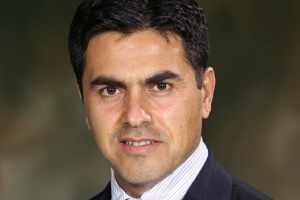
Yerevan Saeed is a Research Associate at Middle East Research Institute (MERI). He is a Ph.D. candidate at the Carter School for Peace, George Mason University. He previously served as White House Correspondent for Kurdish Rudaw TV and has worked for news agencies including the New York Times, NPR, the Wall Street Journal, the Boston Globe, the BBC, and The Guardian as a journalist and translator.
Bilal Wahab is the Nathan and Esther K. Wagner fellow at The Washington Institute, where he focuses on governance in the Iraqi Kurdish region and in Iraq as a whole. He has taught at the American University of Iraq in Sulaimani, where he established the Center for Development and Natural Resources, a research program on oil and development. He earned his Ph.D. from George Mason University; his M.A. from American University, where he was among the first Iraqis awarded a Fulbright scholarship; and his B.A. from Salahaddin University in Erbil. Along with numerous scholarly articles, he has written extensively in the Arabic and Kurdish media.

